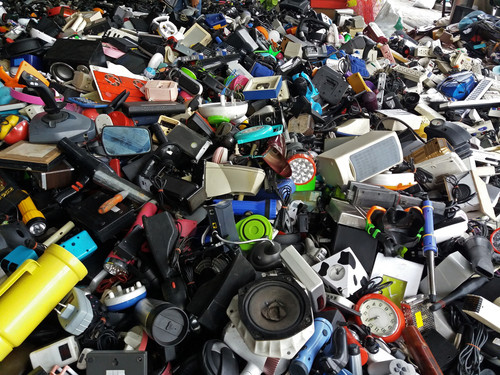Popular Reads
Top Results
Can't find what you're looking for?
View all search resultsPopular Reads
Top Results
Can't find what you're looking for?
View all search resultsE-waste a major challenge for the planet
In spite of a host of interesting initiatives to generate value from it, like using bacteria to bind with precious metals it contains, most e-waste is either incinerated or sent to landfill, and only 17.4 percent is recycled.
Change text size
Gift Premium Articles
to Anyone
A
ccording to the Global E-waste Monitor 2020 drafted in collaboration with the United Nations University and published this past July, Europeans produce an average of 16.2 kilograms of e-waste (discarded electronic and electrical equipment) every year, which is the equivalent of close to eight portable computers per person, while those in Oceania produce 16.1 kg of e-waste per person and those in the Americas 13.3 kg per person.
On the level of the planet, a record 53.6 million tonnes of e-waste was generated in 2019. In spite of a host of interesting initiatives to generate value from it, like using bacteria to bind with precious metals it contains, most e-waste is either incinerated or sent to landfill, and only 17.4 percent is recycled.
Every year, the volume of telephones, televisions and computers in the world increases by 2.5 million metric tons.
All of these objects, which have a relatively short life of being used, will ultimately be added to a growing mountain of waste.
According to a recent report by the United Nations University, 53.6 million tons of e-waste were generated around the globe in 2019.
This amounts to 7.1 kilograms per capita for each member of the global population, with much higher figures for Europe, Oceania and the Americas. And the overall amount of e-waste is expected to double by 2030.
In spite of its potential value, four fifths of e-waste is not recycled, and this amounts to a dual tragedy, because unprocessed e-waste is a major environmental hazard which could in many instances provide a significant source of revenue.
Read also: Global electronic waste up 21 percent in five years, and recycling isn't keeping up
Tons of dangerous substances released into the environment
In 2019, only 17.4 percent of e-waste was collected and recycled.
According to the United Nations University report, Europe is a good student in this regard, recycling 42.5 percent of its e-waste, which is either processed in its country of origin or sold to markets in the developing world.
But what exactly happens to the 82.6 percent of e-waste that is not recycled?
Most discarded electronic and electrical equipment ends up in vast scrap yards, which are little more than open-air dumps with no protection other than a surrounding perimeter fence.
And from these dumps, there is a largely undocumented flow of toxic substances into the environment. In 2019, these included an estimated 50 tons of mercury, and 98 million tons of CO2 equivalents from discarded refrigerators and air conditioners.
Read also: World's e-waste ‘unsustainable’, says UN report citing China, India and US
48 billion euros thrown away
From an economic point of view, failure to address the problem of e-waste results in the loss of billions of euros.
In 2019, the intrinsic value of gold, silver, copper, platinum and other high-value, recoverable materials in global e-waste was estimated to be worth 48 billion euros, an amount that is higher than the GDP of many countries around the globe.
In the current period of crisis, better management of the world’s e-waste could not only result in major benefits for the environment but also in significant economic savings.











